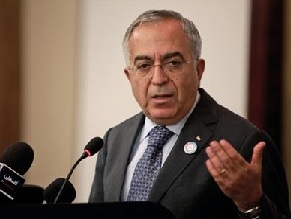|
World Jewish News

Salam Fayyad has held the Palestinian prime ministership for the past eight years.
|
EU Foreign Ministers ‘regret’ Palestinian PM’s resignation, as EU leaders silent at announcement
15.04.2013, Israel The leaders of the EU’s main institutions failed to respond Monday to news of the Palestinian Authority (PA)’s apparent implosion, after it was confirmed that Prime Minister Salam Fayyad had submitted his resignation.
Neither EU foreign policy chief Catherine Ashton, EU Commission head Jose Manual Barroso or European Parliament President Martin Schulz issued any official statement after PA President Mahmoud Abbas accepted Fayyad’s official resignation from government Saturday over reported differences of opinion on policy.
Despite Palestinian news agency Wafa reporting Abbas had asked Fayyad to stay on as interim PM whilst he searches a replacement for him, Abbas’ office has insisted it will appoint his successor in the coming days, in an effort not to undermine the President’s recent efforts at intra-Palestinian reconciliation with arch enemies and Gaza rulers Hamas, a cause championed by the EU. Fayyad’s resignation is likely to cause some degree of embarrassment for the EU which has been vocal in its support of the PA, both financially and politically, and sought to encourage greater unity between Palestinian factions, including the internationally designated terrorist group Hamas, in order to propel the stalled Middle East Peace Process.
In the absence of any united European rhetoric, it was left to the Foreign Ministers of Europe’s major powers to respond to the shock news, as British Foreign Secretary William Hague expressed his “regret” at the loss of a “close partner” in Europe’s attempts to support Palestinian state-building. Heralding his “outstanding contribution” to the Palestinian political landscape.
Hague insisted his contribution had resulted in “stronger and more transparent” institutions in the West Bank, despite the PA’s widely-reported financial meltdown.
His resignation, the British minister cautioned, served as a “reminder of the urgency of returning to negotiations on a two-state solution”, as he reiterated his repeated calls that 2013 be realised as “a crucial year for Middle East peace”, and committed the UK’s continued efforts to support Abbas’ work in this respect, alongside Israeli Premier Benjamin Netanyahu, the US and the EU.
German Foreign Minister Guido Westerwelle echoed Hague’s regret, as he too paid tribute to the outgoing PM’s trustworthiness, attributing to him responsibility “for a large proportion of the considerable progress in laying the foundations for a Palestinian state system”. Westerwelle too expressed the need to continue on the path towards achieving a desired two-state solution to end territorial and political disputes in the region.
Close Israeli allies Germany and the UK were notable abstainers from last November’s UN General Assembly vote on the PA’s bid for; non-member observer status, citing concerns over whether unilateral action would indeed succeed in ending the stalemate in the peace process.
A fellow historic friend of the Jewish State, Italy, also responded to the Palestinian political fallout, having been a surprise supporter of the PA bid at the UNGA. Italian Premier Mario Monti, currently serving in a dual role as acting Foreign Minister following the departure of previous incumbent Giulio Terzi following ideological differences of his own with Monti’s administration, saying he was “deeply sorry” for the news.
He was keen to reiterated however his “intense personal relationship” with Abbas however, as he insisted that “the commitment to strengthening the capacity of the Palestinian National Authority government is a priority of our activity in the region”.
Invoking Fayyad’s stated personal commitment to intra-Palestinian recognition, he cautioned that the “structure of stable government and an economic life in the territories are indispensible conditions for the necessary improvement of the conditions of the Palestinian people, and are a precondition for the resumption of the peace process”.
Meanwhile, political insiders in the Middle East expressed surprise at Abbas’ acceptance of Fayyad’s offer of resignation which was rumoured to have been issued Wednesday, with reports that the move was a concession to Hamas in the interests of reconciliation in response to Egypt-brokered talks earlier this year, after Hamas vetoed Fayyad’s leadership of a future Palestinian unity government, being roundly rejected by Hamas spokesman Sami Abu-Zuhri.
Abbas’ own ruling Fatah party deflected responsibility onto the US administration, which it claimed had interfered in the proces. Fatah Central Committee Member Azzam al-Ahmed insisted “the United States interferes in almost every public process internationally, but what happened in the Palestinian arena is humiliation we are not prepared to accept”.
by: Shari Ryness
EJP
|
|
